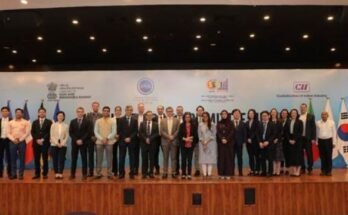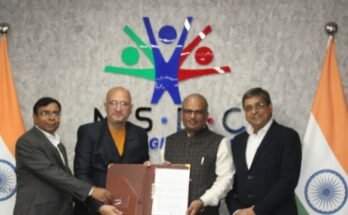New Delhi: – Mr. Akhil Gupta Vice-Chairman Bharti Enterprises and President TSSC launch Telecom Sector Skill Council’s Dynamic Portal http://www.tsscindia.com/ in the Annual General Body Meeting held at Bharti Headquarters. Dynamic portal that streamlines internal processes and enables its partners to dynamically interact with TSSC, to conduct all skill related training activities through specially designed dashboards. Fully automated, Dynamic Portal is with Content Management System (CMS) for dynamic system operations and maintenance.
At the launch, many dignitaries were present like Mr. Akhil Gupta, Vice-Chairman Bharti Enterprises and President TSSC, Mr. P Balaji, Director-Regulatory & External Affairs, Vice- President TSSC, Mr. Pankaj Mohindroo, National President ICA & Secretary TSSC, Mr. Arvind Bali, Director & CEO Videocon & Treasurer TSSC and Dr. S. P. Kochhar CEO TSSC along with various other eminent people from Industry, Ministry and NSDC.
The President TSSC, Mr. Akhil Gupta in his opening remarks mentioned, that while TSSC has done a commendable job in terms of both the volumes and quality of training & certification and is rated as one of the best performers in all Skill Councils, the overall number of total trainings with just over 500,000 in the last 4 years is still nowhere near the potential for skilling in India. He expressed his desire to see more coordination amongst the Centre and the Central Ministries, State Governments, other agencies of the Government engaged in skill related activities, NSDC and Sector Skill Councils to achieve this purpose.
He further emphasized that one major transformation which should be discussed and deliberated with the Government officials is the need to incentivize the employers and not only the students for providing employment to those candidates who have been certified by the Sector Skill Council, since the fundamental purpose of skilling is not only training but provision of jobs for those who qualify. Commenting on the TSSC performance, Vice- Chairman TSSC Mr. P Balaji said that good targets have been achieved by TSSC in Skilling. I congratulate the whole TSSC team for doing exemplary work in terms of quality of training imparted, the high standards set for certification and also the various technology initiatives taken.
Through automated dynamic portal, TSSC’s efforts to train youth, particularly in rural India and smaller towns are truly commendable. Going forward TSSC now needs to increase its focus on job aggregation, placement of skilled candidates and create a larger pool of skilled workforce in the Telecom sector. Secretary TSSC, Mr. Pankaj Mohindroo stated that rapid progress is being witnessed in the mobile handset and components manufacturing sector. Over the period of the next 10 years, there will be a requirement of 5 million people in the manufacturing sector. There is also an urgent need to bridge massive skill gap and competencies in the mobile handset manufacturing industry. We in India, need a special focus to develop appropriate skill sets in the various manufacturing job roles.
Commenting on the performance of TSSC, he added, “It is indeed noteworthy, that the Telecom Sector Skill Council (TSSC) has come a long way in the past one year and I am confident, that the council will continue to do so in the years to follow”. Mr. Arvind Bali, Treasurer TSSC mentioned during the AGM, that best part is that Leadership Team is thinking of running TSSC, even without Government support and also to best utilize funds for the development of industry which in turn will generate employment for TSSC trained manpower.
The Director of NSDC, Mr. Anand Mohan Jha also briefed the General Body on the current thrust areas that have been brought into the workings of Skill Councils, which would ensure equal distribution of target numbers, as per the forecasts of various sector growth and geographical areas not adequately covered. The changes would also usher in improved quality of training.



